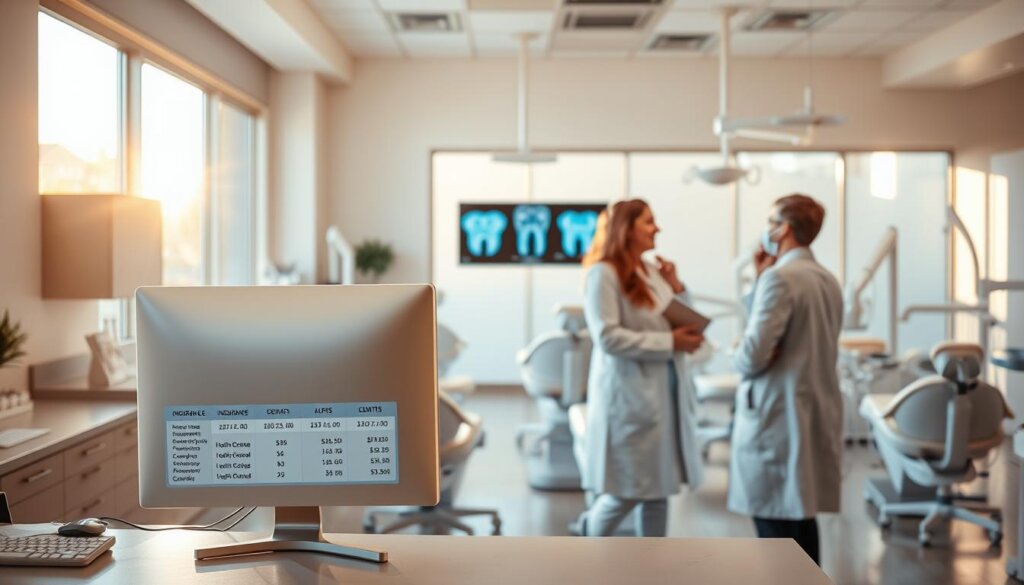What If a Piece of My Tooth Broke Off and I Swallowed It?
Nearly five percent of urgent dental visits in the United States involve patients who accidentally swallow fragments of a broken tooth. This number may surprise those who have never imagined such an event could happen.
What if a piece of my tooth broke off and I swallowed it? The immediate shock often sparks questions about safety and the next steps to take. Most people discover that the fragment passes through the digestive tract without issues, but caution is wise. Dental and medical professionals emphasize staying alert for any unusual symptoms or sharp pain.
Key Takeaways
- Accidental ingestion of a tooth piece can feel alarming but is relatively common.
- A small tooth fragment often passes naturally through the body.
- Dental experts recommend examining the mouth for further breaks or sharp edges.
- Consulting a dentist helps rule out infection or complications.
- Monitoring digestion signs can bring peace of mind in most cases.
- Active communication with dental professionals is key for best outcomes.
Understanding Tooth Fractures
Teeth can break from sudden impacts, biting hard objects, or hidden decay. These breaks might not be noticed until you feel pain or see a chip. Sometimes, swallowing a tooth piece makes you wonder how fractures happen and what signs to look for.
Enamel layers have different strengths. So, chips and cracks can be small or very serious. Knowing why these injuries happen helps us treat them better and keep our teeth healthy.
Common Causes of Tooth Fractures
Playing sports, grinding teeth, and hard foods can weaken teeth. Cavities make them even more vulnerable. Even small accidents can make hidden problems worse, leading to fractures that need quick dental care.
Types of Tooth Fractures
- Minor Chips: Affect the surface enamel
- Cusp Fractures: Disrupt a tooth’s chewing surface
- Vertical Root Fractures: Extend into deeper layers below the gumline
Symptoms Associated with Tooth Fractures
Signs include sharp pain, tenderness when biting, and gum irritation. Bleeding can happen if the fracture hits sensitive areas. If pain lasts, you should see a dentist.
| Fracture Type | Typical Symptom |
|---|---|
| Surface Chip | Minimal pain or sensitivity |
| Cusp Break | Sharp edge and biting discomfort |
| Deep Fracture | Continuous ache or swelling |
Immediate Actions to Take
Discovering a broken tooth swallowed can be scary. It’s important to stay calm and take the right steps. Start by rinsing your mouth with lukewarm water to remove small pieces and protect your gums.
Stay Calm and Assess the Situation
Being too anxious can make things worse. First, check if any tooth pieces are left in your mouth. Look at your tongue and cheeks to avoid hurting them. If you think a big piece is stuck, call a dentist.
Monitor for Any Symptoms
After swallowing a tooth, watch for signs in your body. Look out for stomach pain, trouble swallowing, or chest tightness. Sometimes, small pains go away on their own. But if they don’t, see a dentist to be sure.
What to Avoid After Swallowing a Tooth Fragment
Don’t try to push the tooth out or use strong laxatives. They can make things worse. Stick to gentle methods to avoid hurting yourself. This way, you can get the help you need from a dentist.
When to Seek Medical Attention
Swallowing a tooth fragment can be confusing. Sometimes, just watching is enough. But other times, you need to get help fast. Knowing when to act can keep you safe.
“Early intervention often prevents more serious complications,” according to the American Dental Association.
Signs That Require Immediate Care
Some signs mean you need help right away. Look out for severe throat or belly pain, ongoing bleeding, or sudden swelling. Also, watch for vomiting, dizziness, or trouble breathing.
Contacting Your Dentist
Calling your dentist is a good first step. Tell them what happened and any pain you’re feeling. This helps them figure out if you need to see them or not.
Visiting the Emergency Room
For some problems, the hospital is better. If you’re having trouble breathing or sharp pain, they can help. They work with dentists to make sure you get the right care.
Risks of Swallowing a Tooth Fragment
Swallowing a broken tooth piece can cause problems. Some people might pass it without trouble. Others might feel throat or digestive discomfort. Knowing these risks helps you act fast.
Potential Health Concerns
Small fragments can scratch or irritate the esophagus, leading to minor bleeding. A big piece might block the airway. Getting checked out can stop more issues.
Complications to Watch For
Bacteria can cause serious inflammation if they get into damaged tissue. Look out for fever and pain. Seeing a doctor for unusual stomach signs is key.
Long-Term Effects on Oral Health
A broken tooth can weaken it further. If not treated, it might decay more, leading to infection or tooth loss. Getting help quickly can prevent this.
| Potential Issue | Recommended Action |
|---|---|
| Tissue Irritation | Use a mild mouth rinse for relief |
| Excessive Bleeding | Seek immediate medical advice |
| Continuous Pain | Consult a dental professional |
| Fine Particle Ingestion | Monitor any unusual changes or discomfort |
Treatment Options for Broken Teeth
A fractured tooth needs quick action, mainly to avoid swallowed tooth problems. Dentists first check how bad the damage is. They look for signs of exposed pulp or nerve tissue. Their aim is to fix the tooth and make it look good again, all while keeping you comfortable.
Emergency Dental Care
Warm-water rinses help clean the area and fight bacteria. They also use pain relief and temporary fillings to hold the tooth in place. This quick action stops small cracks from getting worse and harming other teeth.
Restorative Procedures Available
For more serious breaks, dentists might use crowns, dental bonding, or root canal therapy. They pick the best option based on the tooth’s condition. Composite resin blends in with your natural teeth, while metal or ceramic crowns are stronger.
Follow-Up Care Instructions
- Brush around repaired areas with gentle pressure
- Schedule routine evaluations to detect early issues
- Monitor any unusual sensitivity and report changes
Following these steps helps avoid infections and prevents more problems from swallowed tooth issues.
Preventing Tooth Fractures
Strong enamel is key to avoiding damage. Early action helps prevent cracks and reduces the risk of swallowing tooth fragments.
Importance of Regular Dental Check-Ups
Regular dental visits are a first line of defense. They offer early screenings for small problems. Dentists use X-rays to find hidden cracks and suggest mouthguards for sports.
Going for regular check-ups helps keep your teeth strong. You get advice tailored to your needs.
Oral Hygiene Practices
Brushing with fluoride toothpaste and flossing daily keeps enamel strong. Use a soft-bristled brush to protect your gums. Rinsing with water after eating sweets helps avoid acid damage.
This simple routine helps prevent chips in your teeth.
Dietary Considerations
Hard candies, ice cubes, and kernels can damage your teeth. Choose softer snacks to protect your enamel. Avoid sugary drinks to prevent cavities.
Drinking plenty of water helps keep your mouth healthy.
Understanding Digestive Safety
Swallowing a fractured tooth fragment might raise health concerns. Many doctors say most fragments pass through the digestive system without causing blockages or severe pain.
What Happens After Swallowing a Tooth Piece?
A tooth shard usually moves through the digestive system and comes out in one to two days. Baby teeth are often less of a worry because of their smaller roots. It’s smart to watch for any discomfort, though, if the fragment looks jagged.
Digestive System’s Response
The esophagus, stomach, and intestines have strong linings to handle different textures. A swallowed tooth is treated like other foreign objects and broken down as much as possible before it’s eliminated.
Risks of Tooth Fragments in the Digestive Tract
A big or sharp piece can irritate the intestinal walls. It’s important to watch for signs of bleeding or ongoing cramping. Dental first aid often aims to calm the patient and advise against trying to pull out the fragment, which could damage tissues.
Psychological Effects of Dental Issues
Dental problems can weigh heavily on your mind and affect your daily life. People often feel uneasy when they remember past pain or worry about future treatments. This feeling can grow stronger if they’ve had unexpected issues, like breaking a tooth at home.
Anxiety About Dental Health
Many people feel anxious about dental health, unsure of what will happen during procedures. Some worry about the cost, while others fear intense pain. These fears can get worse if not addressed.
Coping Strategies
There are ways to calm your mind and find balance:
- Try relaxation techniques before your appointment
- Use guided imagery to lower stress
- Ask questions to understand treatment options
When to Talk to a Therapist
If you’re putting off dental care and feeling sad or scared, it’s time to talk to a therapist. Therapy provides a safe space to discuss your concerns and regain control.
Dental Care Insurance and Costs
Many people get confused when dental emergencies happen. Insurance plans vary, and what they cover depends on the problem. Knowing how your policy works can help with unexpected costs.
Insurance Coverage for Dental Emergencies
Some providers like Delta Dental, Blue Cross Blue Shield, and Cigna have plans for urgent care. These plans might cover things like broken crowns or lost fillings. But, others might only pay for basic checks.
Key points to explore:
- Deductibles that apply to emergency visits
- Restrictions on specialized procedures
- In-network vs. out-of-network rates
Cost Considerations for Treatments
Prices for things like root canals or fixing teeth vary by state and dentist. Dentists can give you an idea of costs. This helps you see if you can afford it. You might also be able to set up payment plans, depending on the dentist.
| Provider | Typical Coverage |
|---|---|
| Aetna | Partial emergency treatment |
| Delta Dental | Includes urgent care expenses |
| UnitedHealthcare | Tiered plans with varied benefits |
Options for Uninsured Patients
Community health centers and discounted dental programs can help with costs. University clinics might offer treatments by students under a dentist’s watch. You can also look into financing options to help pay for care.
Frequently Asked Questions
Many people wonder if swallowing a tooth fragment is dangerous. Taking care of your teeth means knowing the risks and when to see a doctor. We aim to give clear answers to help you make smart choices.
Can I swallow a piece of my tooth?
Most small tooth pieces go through your system without trouble. But, a sharp or big piece might bother your lining. It’s smart to watch for any pain. A dentist can check for hidden problems.
How soon should I see a dentist?
Seeing a dentist early is important. They suggest calling within a day or two. They might do an X-ray to check if anything is stuck or causing harm.
What if I notice pain later?
If you feel pain, swelling, or irritation, it could mean infection or injury. Going to a trusted dentist quickly can stop more problems and fix deeper issues.
| Common Concern | Care Recommendation |
|---|---|
| Minor discomfort | Monitor for persistent irritation |
| Sharp tooth edge | Seek evaluation to prevent tissue injury |
| Prolonged swelling | Consult a dentist for possible infection |
Dental Myths and Misconceptions
Misinformation can confuse people about how to take care of their teeth. Some think swallowing any tooth fragment is dangerous. But, the danger depends on the fragment’s size and where it broke off.
Common Misunderstandings About Tooth Care
Brushing and flossing regularly is key to healthy teeth. But, myths say extra scrubbing or homemade remedies fix all dental issues. This leads to using too much abrasive toothpaste or skipping dental cleanings.
- Excessive whitening can thin enamel.
- Prolonged clenching strains jaw muscles.
Clarifying Myths About Swallowing Teeth
Some believe swallowing a tooth always causes serious harm. But, a small piece might pass without issue. Sharp edges or health problems increase the risk. That’s why seeing a dentist quickly is important.
Importance of Consulting Professionals
Dentists and oral surgeons give advice based on science. They check dental damage, suggest treatments, and talk about possible problems. Their expert advice helps make safe and informed choices for everyone.
Resources for Dental Emergencies
Urgent tooth problems can happen at any time. It’s important to find quick relief to avoid more issues and pain. Knowing where to go for help is key.
Finding a 24/7 Dentist Near You
Some clinics are open all the time for urgent care. You can find them in local hospital listings and dentist directories. Keeping a list of contacts helps get quick treatment and reduces pain.
Online Dental Consultations
Teledentistry lets you talk to experts online. They can check your symptoms through video calls or chats. This is great for getting help right away, even if you can’t see a dentist in person.
National Dental Associations Contact Info
Groups like the American Dental Association and the Academy of General Dentistry have big lists of dentists. They offer emergency lines and referrals. Having this info ready helps you feel more prepared and calm.
Conclusion: Staying Informed and Prepared
Knowing what to do if you swallow a tooth fragment can help you stay calm. A broken tooth might seem scary, but knowing the right steps can make you feel more confident.
Summary of Key Points
A tooth piece might go through your digestive system without trouble. But, getting dental help right away is key to avoid problems. Following advice from trusted groups like the American Dental Association can help ease your worries.
Encouragement for Regular Dental Visits
Regular dental visits can prevent tooth breaks. Cleanings and exams let dentists find issues early. This can save you from bigger problems and expensive bills later.
Importance of Awareness and Education
Learning first-aid and knowing where to find dental help is important. It helps you recognize signs of trouble and find dental care. Keeping up with dental education keeps you ready and helps maintain good oral health.




